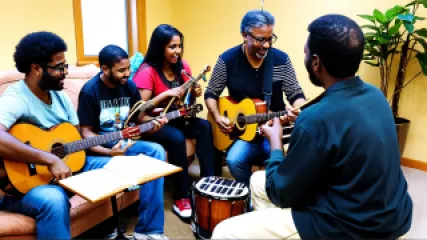How can music therapy benefit creativity?
Music therapy is a powerful tool that has been used for centuries to promote healing, relaxation, and emotional well-being. It utilizes the therapeutic benefits of music to address various physical, emotional, cognitive, and social needs of individuals. While music therapy can be beneficial for a wide range of purposes, one area where it particularly shines is in fostering creativity.
What is Music Therapy?
Before delving into the ways in which music therapy can enhance creativity, let's first understand what music therapy is all about. Music therapy is an evidence-based practice that involves using music interventions to achieve therapeutic goals. These interventions can include listening to music, creating music, singing, playing instruments, and engaging in music-related activities.
Music therapists are highly trained professionals who use their expertise in music and psychology to assess individuals' needs and develop personalized treatment plans. They work with people of all ages and backgrounds, including children, adults, and the elderly, to address a wide range of physical, emotional, cognitive, and social challenges.
The Benefits of Music Therapy
Music therapy offers numerous benefits, including:
- Emotional Healing: Music has the power to evoke emotions and provide a safe outlet for expressing them. Music therapy can help individuals process and cope with difficult emotions such as grief, trauma, or anxiety.
- Stress Reduction: Listening to calming music or engaging in musical activities can activate the body's relaxation response, reducing stress levels and promoting a sense of calm.
- Enhanced Cognitive Function: Music therapy has been shown to improve cognitive skills such as attention, memory, and problem-solving abilities. It can be particularly beneficial for individuals with neurological conditions like Alzheimer's disease or traumatic brain injuries.
- Improved Communication: Music provides a nonverbal form of communication that can be especially helpful for individuals who struggle to express themselves verbally. Through music therapy, people can connect and communicate with others in meaningful ways.
- Social Connection: Group music therapy sessions can promote social interaction and foster a sense of belonging. Making music together encourages teamwork, cooperation, and enhances interpersonal skills.
- Physical Rehabilitation: Music therapy can support physical rehabilitation by incorporating rhythmic patterns, movement, and coordination exercises into treatment plans. It can help improve motor skills and enhance overall physical functioning.
Music Therapy and Creativity
Creativity is an essential aspect of human expression and plays a crucial role in various domains of life, including the arts, problem-solving, and innovation. Music therapy provides a unique platform for enhancing creativity through its therapeutic applications.
1. Expressive Outlet: Music therapy offers individuals a creative outlet for self-expression. Whether it's through writing songs, playing instruments, or engaging in improvisation, music provides a safe space for individuals to express their thoughts, emotions, and experiences in a nonverbal and symbolic manner.
2. Emotional Exploration: Creativity often emerges from deep emotional experiences. Music therapy allows individuals to explore and process their emotions through musical expression. By channeling emotions into music, individuals can gain insights, find new perspectives, and discover creative solutions to personal challenges.
3. Improvisation and Experimentation: In music therapy, improvisation is a key technique that encourages individuals to think outside the box and explore new possibilities. Through improvisation, individuals can experiment with different musical elements, take risks, and embrace the unexpected. This process fosters creative thinking and helps individuals develop their unique artistic voice.
4. Enhancing Problem-Solving Skills: Music therapy often involves collaborative activities that require individuals to work together to create music. This promotes problem-solving, adaptability, and flexibility as individuals navigate the challenges of creating harmonious sounds in real-time. These skills can transfer to other areas of life and enhance overall creative problem-solving abilities.
5. Stimulating the Imagination: Music has the power to evoke vivid imagery and stimulate the imagination. In music therapy sessions, individuals can explore different musical styles, genres, and sounds that inspire their imagination. This can lead to the development of new ideas, artistic concepts, and innovative approaches to creative endeavors.
Conclusion
Music therapy is a versatile and powerful tool that offers numerous benefits for emotional healing, personal growth, and creativity. Through music therapy, individuals can tap into their inner creative resources, explore emotions, experiment with new ideas, and develop their artistic voice. Whether you are a professional artist or someone seeking personal growth, music therapy can provide a therapeutic space for unleashing your creative potential.






